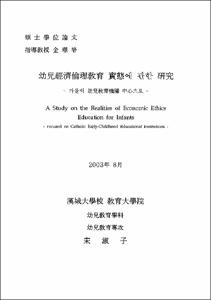幼兒 經濟倫理 敎育 實態에 관한 硏究
= (A) study on the realities of economic ethics education for infants : focused on Catholic early-childhood educational institutions
- Type
- Thesis
- Alternative Title
- 가톨릭 幼兒敎育機關 中心으로
- Department
- 幼兒敎育學科幼兒敎育專攻
- Issued Date
- 2003
- Publisher
- 漢成大學敎 敎育大學院
- Keyword
- 유아경제윤리교육; 가톨릭 유아교육기관; 절약; 저축
- Files in This Item:
-
-
Download
 000000066416.pdf
기타 데이터 / 2.62 MB / Adobe PDF
000000066416.pdf
기타 데이터 / 2.62 MB / Adobe PDF
-
Items in Repository are protected by copyright, with all rights reserved, unless otherwise indicated.